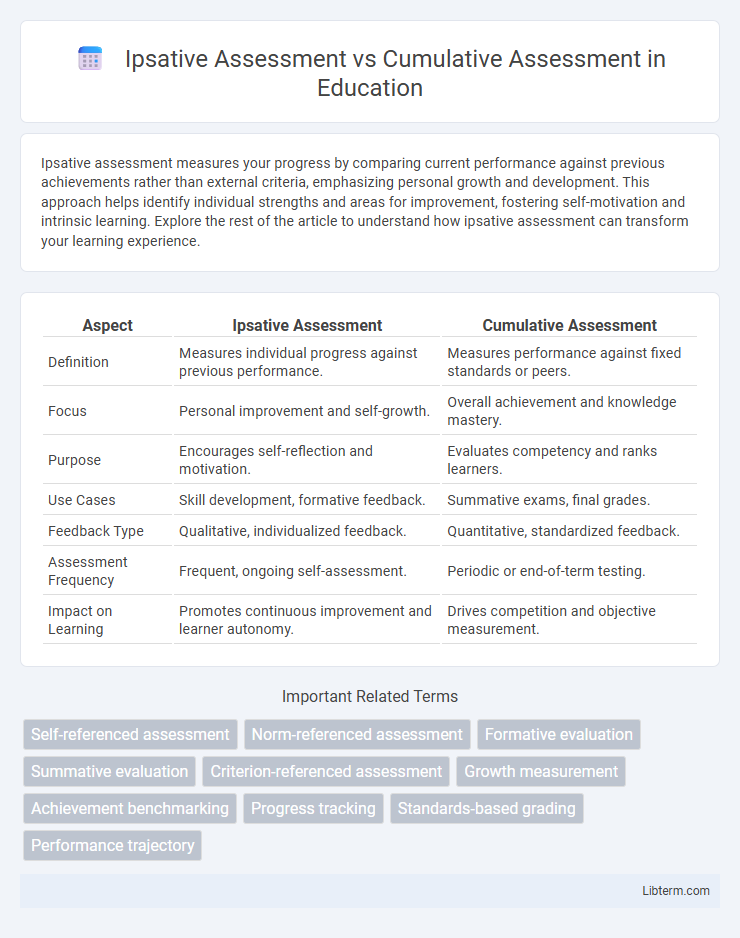Ipsative assessment measures your progress by comparing current performance against previous achievements rather than external criteria, emphasizing personal growth and development. This approach helps identify individual strengths and areas for improvement, fostering self-motivation and intrinsic learning. Explore the rest of the article to understand how ipsative assessment can transform your learning experience.
Table of Comparison
| Aspect | Ipsative Assessment | Cumulative Assessment |
|---|---|---|
| Definition | Measures individual progress against previous performance. | Measures performance against fixed standards or peers. |
| Focus | Personal improvement and self-growth. | Overall achievement and knowledge mastery. |
| Purpose | Encourages self-reflection and motivation. | Evaluates competency and ranks learners. |
| Use Cases | Skill development, formative feedback. | Summative exams, final grades. |
| Feedback Type | Qualitative, individualized feedback. | Quantitative, standardized feedback. |
| Assessment Frequency | Frequent, ongoing self-assessment. | Periodic or end-of-term testing. |
| Impact on Learning | Promotes continuous improvement and learner autonomy. | Drives competition and objective measurement. |
Introduction to Assessment Methods
Ipsative assessment measures a learner's progress by comparing current performance to their previous results, emphasizing personal growth and self-improvement. Cumulative assessment evaluates overall achievement by aggregating knowledge and skills acquired over time, reflecting mastery relative to established criteria or standards. Understanding these methods is crucial for designing targeted educational strategies that balance individual development with standardized evaluation.
Defining Ipsative Assessment
Ipsative assessment measures a learner's progress by comparing current performance against their previous results, emphasizing personal improvement and self-referenced growth. Unlike cumulative assessment, which evaluates performance against a fixed standard or group norms, ipsative assessment encourages intrinsic motivation and individualized learning paths. This method is particularly effective in fostering self-reflection and adaptive learning strategies in educational and professional development contexts.
Understanding Cumulative Assessment
Cumulative assessment evaluates a learner's knowledge by aggregating performance across multiple tests or assignments over a period, providing a comprehensive measure of overall achievement. This method captures growth and retention by comparing scores against a fixed standard rather than previous personal performance, unlike ipsative assessment which focuses on individual progress. Educators rely on cumulative assessment to identify consistent learning trends and to inform decisions about mastery of curriculum objectives.
Key Differences Between Ipsative and Cumulative Assessment
Ipsative assessment measures a learner's progress by comparing current performance against their previous results, emphasizing personal growth and self-improvement. Cumulative assessment evaluates knowledge and skills based on a set benchmark or criteria, aggregating performance over time to determine overall achievement or mastery. Ipsative assessment is individual-centered and motivational, while cumulative assessment is normative and comparative across a cohort.
Benefits of Ipsative Assessment
Ipsative assessment promotes personalized learning by measuring a student's progress against their previous performance, fostering intrinsic motivation and self-awareness. It encourages continuous improvement and reduces competition among peers, creating a supportive learning environment. This approach enables tailored feedback, helping learners set realistic goals and track their growth over time effectively.
Advantages of Cumulative Assessment
Cumulative assessment evaluates a student's overall knowledge and skills by aggregating performance over multiple tasks or periods, providing a comprehensive measure of learning progress. This type of assessment supports long-term retention and mastery by encouraging consistent study habits and reinforcing previously learned material. By offering a broad perspective of academic achievement, cumulative assessment helps educators make informed decisions about curriculum effectiveness and individualized instruction.
Challenges of Ipsative Assessment
Ipsative assessment presents challenges such as difficulty in standardizing performance comparisons across different learners due to its self-referential nature. It can also lead to motivational issues when learners perceive limited progress or when consistent self-referencing reduces the relevance of external benchmarks. Furthermore, the lack of objective criteria complicates the measurement of achievement levels and complicates integration with cumulative assessment frameworks.
Limitations of Cumulative Assessment
Cumulative assessment often fails to capture individual student progress as it aggregates performance over time, masking improvements or regressions in specific skills. It may promote memorization rather than deep understanding, as students focus on retaining information for comprehensive exams instead of developing mastery step-by-step. The reliance on cumulative assessment can also increase anxiety and reduce motivation, since a single exam heavily influences final grades regardless of ongoing learning variations.
Choosing the Right Assessment Approach
Selecting the appropriate assessment approach depends on educational goals, with ipsative assessment emphasizing personal progress by comparing current performance to past achievements, fostering intrinsic motivation and self-improvement. Cumulative assessment evaluates learners against fixed standards or peer performance, providing comparative data useful for grading and benchmarking. Educators must align assessment types with desired outcomes, considering factors like student needs, subject matter, and instructional objectives to optimize learning and development.
Future Trends in Educational Assessment
Ipsative assessment emphasizes individual progress by comparing a student's current performance to their previous achievements, fostering personalized learning paths and motivation. Cumulative assessment aggregates knowledge over time, providing a comprehensive measure of student mastery and readiness for future academic challenges. Future trends in educational assessment predict increased integration of ipsative and cumulative approaches with adaptive technologies and AI-driven analytics to create more dynamic, personalized, and data-informed evaluation systems.
Ipsative Assessment Infographic

 libterm.com
libterm.com